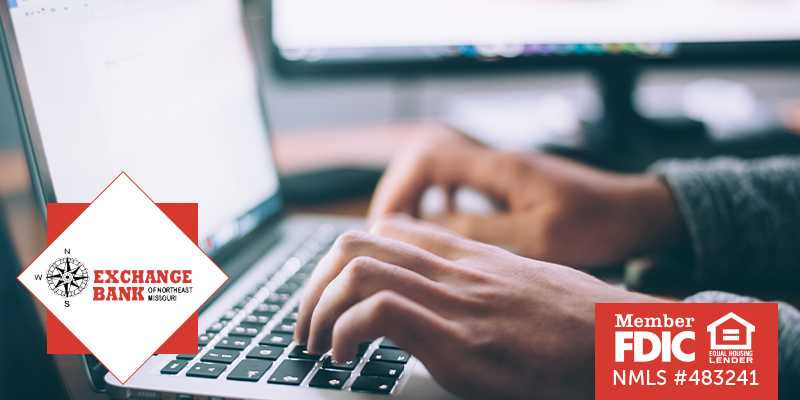Exchange Bank of Northeast Missouri
Updated 10:27 AM CDT, Thu November 4, 2021
Published Under: Cyber Security

As remote work becomes more “normal” in today’s world, it’s important to consider the security risks that come with working from home. Whether you’re an employee or manage employees who work from home, these tips will help protect both you and the company you work for.
1. Use a VPN
If you must use unsecured or public networks, make sure remote employees are using a VPN. This will encrypt all your internet traffic which prevents outsiders from keeping tabs on your activity. Make sure you do your research and use a VPN that has good speed and stability, otherwise it could slow down your internet speeds.
2. Watch Out for Phishing
We’ve all received a phishing email before, and sometimes they’re obvious to catch. Other times, though, phishing emails look realistic and not like scams at all. Be careful and always check the sender’s email address and content of the email before clicking any links or responding. Another clear sign of phishing scams is when there are spelling and grammar mistakes.
3. Utilize Cyber Training Frequently
There are lots of cyber awareness programs that help track and improve the cyber risk of your team. The training your team completes should go over possible cybercriminal situations, how to handle them, rules for device use, new threats to keep in mind and more. This will help your employees feel more prepared when a cybersecurity issue arises.
4. Keep Devices Locked
Locking your device when you walk away from your workspace is an easy task to forget since it’s not a habit formed when you’re in the office. This is extremely important if you’re working in any public setting like a coffee shop, but you should even lock your devices when you’re at home. Your little one could end up messing with your keyboard and pushing buttons, an untrusted roommate might get snoopy... you never know and it’s better safe than sorry!
5. Use Strong and Secure Passwords
One of the most obvious but most important things when it comes to cybersecurity is using strong passwords. Make sure it:
- Doesn’t include personal information
- Includes numbers, special characters, upper and lowercase letters
- Isn’t too short
Password managers are a great option since it can be difficult to remember multiple complex passwords. They’ll keep your strong passwords organized and easy to access for your convenience and safety.
As a business, training staff on cybersecurity has become crucial and will only become more important as time goes on. Remote work isn’t going anywhere anytime soon – if anything it will become more common – so now’s a great time to send this article as a reminder to your team of remote workers!
Exchange Bank of Northeast Missouri
Member FDIC
Equal Housing Lender
Comments